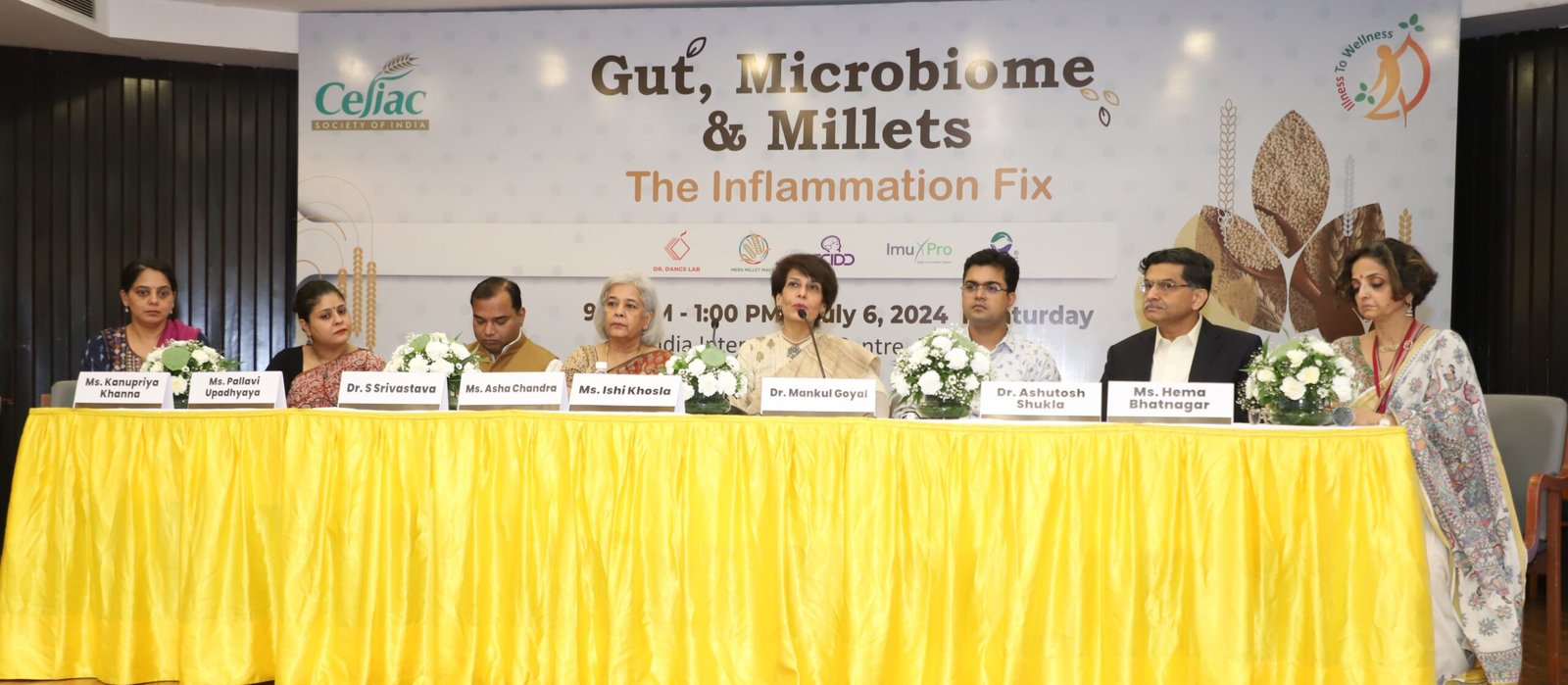Inside BENEO’s new pulse plant: pioneering sustainable protein from faba beans
The Celiac Society of India in partnership with Illness to Wellness organized a Revolutionary Seminar on the Role of Millets in Preventing Gut Inflammation
The Celiac Society of India and the Indian Coalition for the Control of Iodine Deficiency Disorders, in partnership with Illness to Wellness, hosted a transformative seminar titled “Gut, Microbiome & Millets: The Inflammation Fix.” The seminar emphasised the critical role of gut health in combating prevalent nutritional deficiencies and chronic diseases, advocating for practical dietary changes to improve public health outcomes.
Distinguished guests, including Dr Vinod Paul, Member of NITI AAYOG; Meenakshi Lekhi, Former Union Minister; and Dr Chandrakant S. Pandav, Padma Shri awardee and Former Professor & Head of Community Medicine at AIIMS, highlighted the importance of balanced eating for improved gut health and the significance of incorporating millets into the diet.
Anil Rajput, Chairperson of the National CSR Council at ASSOCHAM, remarked, “The collective efforts of the Celiac Society and Illness to Wellness in organising these seminars to raise awareness about gut health are both inspiring and commendable. Gut health is fundamental to our overall well-being, and as many health issues stem from the gut, a healthy gut is the cornerstone of good health. Events like these are indeed critical in reinforcing the need for a balanced diet and the resulting healthy living.”
The seminar addressed the epidemic of nutritional deficiencies and chronic degenerative diseases such as obesity, diabetes, high blood pressure, heart disease, cancers, autoimmune diseases, and mental health issues. “Wellness encompasses nine interconnected components: Physical, Emotional, Social, Creative, Spiritual, Financial, Environmental, and Occupational. Each of these elements is vital to achieving overall well-being,” stated Dr Chandrakant Pandav. He emphasized the need for accelerated action to meet global objectives, referencing the June 2024 UN report that highlighted the slow progress in achieving the Sustainable Development Goals (SDGs).
Dr Vinod Kumar Paul, a Member of NITI Aayog, stressed the need for behavioural change, stating, “We must tackle the nutrition crisis through behavioural change, shifting to nutritious foods like millets instead of processed ones. Our ancestors knew diet influences behaviour, and our Prime Minister has promoted this by celebrating the International Year of Millets and the G20 Presidency. Millets benefit both health and the environment.”
Highlighting the hidden nature of celiac disease and rising trends in obesity, Dr Paul urged parents and caregivers to focus on children’s diets and overall lifestyle. He called for evidence-based changes to reduce obesity and anaemia on a large scale, emphasising preconception care for women and proper complementary feeding for infants.
Meenakshi Lekhi, Former Union Minister, shared her personal experience, stating, “We need a millet revolution, much like the green revolution. Ancient texts from the Neolithic period and the Harappa and Indus Valley civilizations reference millets, highlighting their historical significance. India now produces 20% of the world’s millet and 80% of Asia’s production. It’s time to reclaim millet as our best food, particularly for undernourished children, and promote it for gut health to address many health issues. Remember, ‘food itself is a medicine.'”
Dr. Arjun Dang, CEO of Dr. Dangs Lab, emphasized the importance of diet and highlighted the triple burden of malnutrition: undernutrition, overnutrition, and micronutrient deficiencies. He proposed strategies like enhancing maternal nutrition, deworming campaigns, diversifying diets with millets and pulses, and promoting health education.
Dr. Kapil Yadav, a faculty member at AIIMS New Delhi, noted that anaemia is rooted in nutrition and highlighted the gut’s role as a critical gatekeeper. He linked rising anaemia cases to lifestyle changes and reduced kitchen time, advocating for a return to diverse, nutritious diets.
Dr. Meena Mishra, Consultant Radiation Oncologist and Chairperson of the Brain Behavior Research Foundation of India, emphasized the importance of micronutrients in brain development. “Early childhood nutrition is pivotal for cognitive development; traditions like Ragi ceremonies in Karnataka underscore its importance,” she stated.
Renowned Clinical Nutritionist & Author, Ishi Khosla, added, “Grain Changer is a game changer as modern science reconnects us with our gut. Millets boost haemoglobin in pregnant women carrying twins. The ‘four G’s’—Gut, Girth, Gluten, and Glucose—interconnect to transform our eating habits and lifestyle permanently.”
Dr. Ashutosh Shukla, Senior Director of Internal Medicine, at Max Hospital Gurugram, highlighted the link between lifestyle diseases and gut health. He noted that imbalanced gut bacteria can lead to inflammation, metabolic disorders, and mental health issues.
Dr. Mankul Goyal from AIIMS Delhi concluded, “Gut health impacts lifestyle diseases profoundly. Bacteria, present for over a million years, play a vital role in breaking down fibre and producing essential vitamins. Disruptions in this cycle can lead to metabolic and mental health disorders. Skin issues, from allergies to pigmentation, often originate from gut health. Treating the gut enhances treatment efficacy, linking nutrition to overall harmony in life.”
The seminar concluded with a call to action for adopting millets and prioritizing gut health as vital steps toward achieving better health outcomes and preventing chronic diseases.

